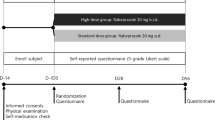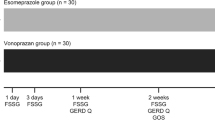Abstract
Gastroesophageal reflux disease (GERD) is a chronic condition, with 50–80% of patients experiencing recurrence within one year of completing initial treatment. In patients with erosive GERD, proton-pump inhibitors (PPI) provide faster healing and symptom relief than do H2-receptor antagonists and have become the treatment of choice. Rabeprazole is a new PPI with demonstrated efficacy in both the acute and maintenance treatment of erosive GERD. The primary objective was to compare efficacy and tolerability of rabeprazole and omeprazole in preventing relapse of healed erosive GERD. Secondary objectives included comparison of efficacy in preventing GERD relapse symptoms and in maintaining quality of life. In this multicenter, double-blind, parallel-group study, 243 patients with healed erosive GERD were randomised to receive rabeprazole 10 mg once daily in the morning (QAM) (N = 82); rabeprazole 20 mg QAM (N = 78); or omeprazole 20 mg QAM (N = 83). Endoscopies were performed at weeks 13, 26, 39 (if clinically indicated), and 52, or when symptoms suggested recurrence. Corpus biopsies were performed at each endoscopy, and antral biopsies were performed at study entry and exit. Rabeprazole 10 mg and 20 mg QAM were equivalent to omeprazole 20 mg QAM for all efficacy parameters. At week 52, relapse rates in the intent-to-treat populations were 5%, 4%, and 5% for rabeprazole 10 mg and 20 mg and omeprazole 20 mg, respectively. All treatments were well tolerated. In conclusion, both rabeprazole 10 mg and 20 mg QAM are equivalent to omeprazole 20 mg QAM in preventing recurrence of erosive GERD.
Similar content being viewed by others
REFERENCES
Wienbeck M, Barnert J: Epidemiology of reflux disease and reflux esophagitis. Scand J Gastroenterol 24(suppl 156):7-13, 1989
Isolauri J, Laippala P: Prevalence of symptoms suggestive of gastro-oesophageal reflux disease in an adult population. Ann Med 27:67-70, 1995
Freston JW, Malagelada JR, Petersen H, McCloy RF: Critical issues in the management of gastroesophageal reflux disease. Eur J Gastroenterol Hepatol 7:577-586, 1995
Olbe L, Lundell L: Medical treatment of reflux esophagitis. Hepato-Gastroenterol 39:322-324, 1992
Dent J, Yeomans ND, Mackinnon M, Reed W, Narielvala FM, Hetzel DJ, Solcia E, Shearman DJ: Omeprazole v ranitidine for prevention of relapse in reflux oesophagitis. A controlled double blind trial of their efficacy and safety [see comments]. Gut 35:590-598, 1994
Sanders SW: Pathogenesis and treatment of acid peptic disorders: Comparison of proton pump inhibitors with other antiulcer agents. Clin Ther 18:2-34, 1996
Sandmark S, Carlsson R, Fausa O, Lundell L: Omeprazole or ranitidine in the treatment of reflux esophagitis: Results of a double-blind, randomized, Scandinavian multicenter study. Scand J Gastroenterol 23:625-632, 1988
Morii M, Takata H, Fujisaki H, Takeguchi N: The potency of substituted benzimidazoles such as E3810, omeprazole, Ro 18-5364 to inhibit gastric H+, K+-ATPase is correlated with the rate of acid-activation of the inhibitor. Biochem Pharmacol 39:661-667, 1990
Fujisaki H, Murakami M, Fujimoto M, Yamatsu I, Takeguchi N: The activity of isolated porcine H+,K+ ATPase is inhibited by E3810. FASEB J 4:A473, 1990 (abstract)
Oketani K, Murakami M, Fujimoto M, Yamatsu I: The secretion of acid from isolated rabbit gastric glands is inhibited by E3810. FASEB J 4:A473, 1990 (abstract)
Shibata H, Murakami M, Fujimoto M, Yamatsu I: Histaminestimulated gastric acid secretion is inhibited in gastric fistula dogs treated with E3810. FASEB J 4:A473, 1990 (abstract)
Prakash A, Faulds D: Rabeprazole. Drugs 55:261-267, 1998
Besancon M, Simon A, Sachs G, Shin JM: Sites of reaction of the gastric H,K-ATPase with extracytoplasmic thiol reagents. J Biol Chem 272:22438-22446, 1997
Williams MP, Sercombe J, Hamilton MI, Pounder RE: A placebo-controlled trial to assess the effects of 8 days of dosing with rabeprazole versus omeprazole on 24-h intragastric activity and plasma gastrin concentrations in young healthy male subjects. Aliment Pharmacol Ther 12:1079-1089, 1998
Robinson M, Maton PN, Rodriguez S, Greenwood B, Humphries TJ: Effects of oral rabeprazole on oesophageal and gastric pH in patients with gastro-oesophageal reflux disease. Aliment Pharmacol Ther 11:973-980, 1997
Cloud ML, Enas N, Humphries TJ, Bassion S: Rabeprazole in treatment of acid peptic diseases: Results of three placebocontrolled dose-response clinical trials in duodenal ulcer, gastric ulcer, and gastroesophageal reflux disease (GERD). Dig Dis Sci 43:993-1000, 1998
Birbara C, Breiter J, Collins D, Jaskir J, Perdomo C, Hahne W: Rabeprazole: Preventing endoscopic and symptomatic relapse in erosive or ulcerative GERD. Am J Gastroenterol 93:1630, 1998 (abstract)
Caos A, Moskovitz M, Perdomo C, Niecestro R, Hahne W: Rabeprazole for the prevention of pathologic and symptomatic relapse of erosive or ulcerative gastroesophageal reflux disease. Gastroenterology 116:A132, 1999 (abstract)
Dekkers CPM, Beker JA, Thjodleifsson B, Gabryelewicz A, Bell NE, Humphries TJ: Comparison of rabeprazole 20 mg vs. omeprazole 20 mg in the treatment of active gastric ulcer-a European multicentre study. Aliment Pharmacol Ther 12:789-795, 1998
Dekkers CPM, Beker JA, Thjodleifsson B, Gabryelewicz A, Bell NE, Humphries TJ: Comparison of rabeprazole 20 mg versus omeprazole 20 mg in the treatment of active duodenal ulcer: A European multicentre study. Aliment Pharmacol Ther 13:179-186, 1999
Dekkers CPM, Beker JA, Thjodleifsson B, Gabryelewicz A, Bell NE, Humphries TJ: Double-blind comparison of rabeprazole 20 mg vs omeprazole 20 mg in the treatment of erosive or ulcerative gastro-oesophageal reflux disease. Aliment Pharmacol Ther 13:49-57, 1999
Hetzel DJ, Dent J, Reed WD, Narielvala FM, Mackinnon M, McCarthy JH, Mitchell B, Beveridge BR, Laurence BH, Gibson GG, Grant AK, Shearman DJC, Whitehead R, Buckle PJ: Healing and relapse of severe peptic esophagitis after treatment with omeprazole. Gastroenterology 95:903-912, 1988
Chiba N: Proton pump inhibitors in acute healing and maintenance of erosive or worse esophagitis: A systematic overview. Can J Gastroenterol 11(suppl B):66B-73B, 1997
Klinkenberg-Knol EC, Festen HPM, Jansen JBMJ, Lamers CB, Nelis F, Snel P, Luckers A, Dekkers CP, Havu N, Meuwissen SG: Long-term treatment with omeprazole for refractory reflux esophagitis: efficacy and safety. Ann Intern Med 121:161-167, 1994
Gardner JD, Rindi G, Dayal Y, Fiocca R, Perdomo C, Jaskir J, Barth J, Humphries T: Evolution of Helicobacter pylori infection, gastritis, and enterochromaffin-like cell hyperplasia in 443 patients with gastroesophageal reflux disease treated for 1 year with rabeprazole or omeprazole. Gastroenterology 116:A168, 1999
Lee JM, O'Morain CA: Different management for Helicobacter pylori positive and negative patients with gastro-oesophageal reflux disease? Gut 43(suppl 1):S14-S20, 1998
VerdÚ EF, Armstrong D, Fraser R, Viani F, Idstrom JP, Cederberg C, Blum AL: Effect of Helicobacter pylori status on intragastric pH during treatment with omeprazole. Gut 36:539-543, 1995
Gardner JD, Rindi G, Fiocca R, Dayal Y, Barth J, Humphries TJ: Changes in H. pylori infection and accompanying pathology during 4 years of rabeprazole treatment. Gut 45:A115, 1999
Smout AJPM: Is the sensitivity to gastric acid inhibition Helicobacter pylori status-dependent? Scand J Gastroenterol Suppl 225:32-35, 1998
Martínek J, Blum AL, Stolte M, Hartmann M, Verdu EF, Luhmann R, Dorta G, Wiesel P: Effects of pumaprazole (BY841), a novel reversible proton pump antagonist, and of omeprazole, on intragastric acidity before and after cure of Helicobacter pylori infection. Aliment Pharmacol Ther 13:27-34, 1999
Author information
Authors and Affiliations
Rights and permissions
About this article
Cite this article
Thjodleifsson, B., Beker, J.A., Dekkers, C. et al. Rabeprazole Versus Omeprazole in Preventing Relapse of Erosive or Ulcerative Gastroesophageal Reflux Disease. Dig Dis Sci 45, 845–853 (2000). https://doi.org/10.1023/A:1005548318996
Issue Date:
DOI: https://doi.org/10.1023/A:1005548318996




